The Millionaires' Express (1986)
Directed by: Sammo Hung
Written by: Keith Wong, Sammo Hung
Starring: Olivia Cheng, Rosamund Kwan, Sammo Hung, Yuen Biao
HONG KONG
AKA FOOGWAI LIP CHE, MILLIONAIRE’S EXPRESS, SHANGHAI EXPRESS
RUNNING TIME: 109 mins [Hybrid Cut]/ 102 mins [Extended/International Version]/ 97 mins [Hong Kong Theatrical Version]/ 92 mins [English Language Version]
AVAILABLE ON LIMITED EDITION BLU-RAY: JULY 26TH, from EUREKA ENTERTAINMENT
REVIEWED BY: Dr Lenera
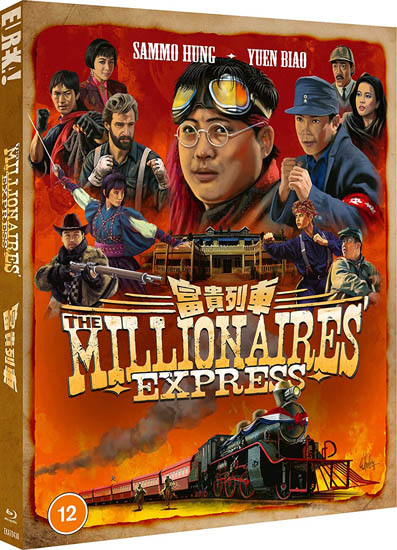
Ching Fong-Tin is a petty criminal who’s caught in Russia by Marshall Fook Loi, who’s been hunting him down, but he escapes to return to his hometown Han Shiu, along with his childhood sweetheart Siu-Hon and her fellow ladies of the night. He once tried to give lots of water to the town by blowing up a dan, but it went wrong and the opposite happened. He now wants to get money into Han Shiu, so as well as cleaning and redressing its hotel, he formulates a plan to force a train carrying lots of rich passengers to stop there, but fireman turned mayor Tsao Cheuk Kin knows he’s up to no good. Two incompetent crooks are also interested in this train and intend to rob it, while on the train are some gangsters led by Yun Shiyu who want to steal a map of the route to the Terracotta Army of Emperor Chin Shin-Huang’s tomb from three Japanese travelers. Oh, and then there’s a large group of outlaws who are heading for the town with the intention of taking everything of worth in it….
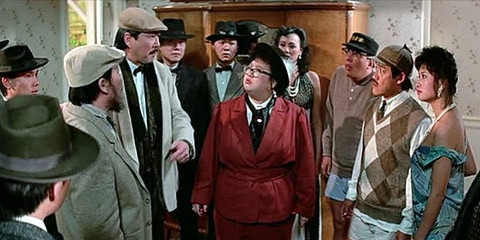
This probably sounds rather pathetic, but I shouted out “Yes”! when I learnt that Eureka Entertainment were continuing their series of Hong Kong movie releases with this Sammo Hung-directed effort which, while I probably wouldn’t rank in the ten greatest Hong Kong films list, surely ranks on my list of the ten most fun. Inspired I guess by the likes of the 1956 version of Around The World In Eighty Days, The Cannonball Run and most of all It’s A Mad Mad Mad Mad World which were packed with well known faces, he decided to make a film which had a star in virtually every shot, be it in a major role or in a cameo, though knowledge of who’s who in no way prevents immense enjoyment from this madcap action comedy which is also a sort of Western [or should that be Eastern], its central location being very much like your archetypal Western town and there being a fair few Western conventions often tweaked – one of the very few disappointments is that the film doesn’t give us its version of a Western gun duel. Hong Kong comedy can be a mixed bag for many of us westerners; I enjoy some of it but there are times when it leaves me cold or even bothers me; I harp on about how bad PC is today every opportunity I can get but the huge amount of supposedly comic sexual harassment in those Lucky Stars films really rubs me up the wrong way. But there’s very little of that here, the mixture of slapstick, farce, sight gags and stunts [people are constantly jumping from rooftops to the ground] coming off very well, and if one joke doesn’t quite come off, the next one probably will. Despite action being slightly [but only slightly] minimised in favour of comedy, there’s still loads of that energy, invention and foolhardiness that so attracted many of us to Hong Kong movies in the first place, and we do get rewarded with an incredible final reel that’s legendary among martial arts film fans.
It was intended to have Tak-Hing Kwan reprise his oft-played role of the folk hero Wong Fei-hung, but Kwan considered the fact that Fei-Hung was to be captured and then rescued to be disrespectful towards the character. This was a very expensive production, though not so expensive that Richard Norton wasn’t given any more than one costume which would repeatedly become soaked with sweat and have to be dried on-set with irons and hairdryers. He’d developed a severe infection from cutting his leg on a plant and Cynthia Rothrock had torn a ligament in her knee, so both had to film their parts kicking with only one leg – not that one really notices, and it didn’t stop Rothrock from kicking Hung’s stunt double so hard in the side of his head that he bled from the ear. Meanwhile Hung himself kicked Yuen Baio so hard in the chest that the latter was unable to draw breath and required assistance from Chin Kar Lok-to start breathing again. Chin – who doubled Yuen a few times – was himself injured when Hung flipped him over his head and he landed on the back of his neck. A very tight shooting schedule demanded round-the-clock work from the cast and crew, who largely lived at the town set at Tai-bo throughout production; all other footage was filmed in Thailand, Canada for the opening scene, and the Golden Harvest studios. The Hong Kong trailer and the poster promise the appearance of over a hundred stars, and they all appear in the credits, but at least five of them don’t show up in the movie. After much cutting, Millionaire’s Express was a major hit. There’s a slightly longer version, also in Cantonese, which had some footage removed but restored more, meaning that it’s five minutes longer than the original Hong Kong version, though the English language release was shorter than both. Eureka’s stupendous release includes all three of these versions – plus another. More details on these in the section on the special features, but I’ll say right here – the Hybrid Cut is the best!
We begin in snowy Russia with shots of a rider on horseback finding some dead soldiers. The rider is, of course, Ching, who starts to steal anything that could be of value from them, but it turns out the soldiers were actually on a training exercise and are very much alive. They strip his clothes down to his underwear, force him to wear a brassiere and the head of a mop as a wig, and make him dance, but he escapes, throws a grenade into the cabin, and is then caught by Fook the Marshall who lectures him about his crimes. A scuffle results in both of them rolling down the hill in a huge snowball which for some reason has had some digital marks put on it; they look awful but it doesn’t really matter. Nor does it really matter when Ching jumps right off for real the very top of a flipping tree which he’d have never been able to climb up. He takes Fook’s clothes and leaves him for his home town where silliness seems to be taking place everywhere. Bandits dressed in police uniforms set fire to a large building, so Tsao Cheuk Kin and his fire team race to the scene with the most pathetic excuse for a fire engine you’ll ever see yet which is actually also very realistic, and save a fat lady and a blind woman. The bandits rob the town bank, but are imprisoned. With the loss of money stolen by the bandits, Mayor Yi gives a negative speech, but Tsao encourages the townfolk and is given the job of mayor and head of the town’s security. His main interest become Ching whose plan to bring some wealth to the town is well intended but hardly within the law. Tsao is played by Yuen Biao, and he and Hung get the first of their three screen fights [amazing seeing all the films they were in together] where they punch, kick, grapple and leap to stunning effect – though it’s not as stunning as what Baio does about ten minutes before, a barani [a front flip combined with a half twist] off the roof of a burning two-story building on to solid ground, then immediately getting up and running to speak to some other characters, all with no cuts – either though he actually broke a leg!
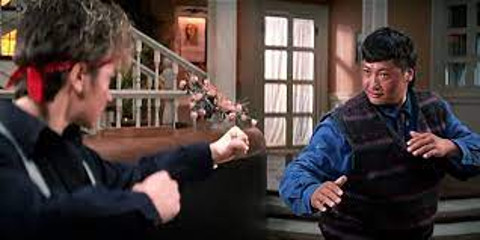
The focus then more becomes this train which various factions are very much interested in, a train populated by gangsters, samurai, cheating husbands, nagging wives, and a lot of rich folk who could maybe do with being relieved of some of their money or more, and one of the things that’s so good about Millionaire’s Express is that, despite all the supporting characters and their antics, the film remains focused and the pace doesn’t sag even though a few signs remain of the heavy cutting such as a few awkward scene transitions. Possibly my favourite of the comedians in the film Richard Ng plays Han, a train passenger in Sherlock Holmes garb who sneaks back and forth on the roof of both the train [Ng doing it for real of course] and the town’s buildings between his fat wife and his beautiful mistress, using his need to go to the toilet as an excuse. These scenes are short and sweet and mingle amusingly with the main plot when he not once but twice encounters the same bad guy climbing about and both are friendly to each other. Indeed it’s perhaps surprising how much of the humour works. Here, while there’s one questionable mention of rape for a joke [which Eureka’s uncut version of My Lucky Stars revealed wasn’t the first time in a Hung-directed film], and the sensitive viewers amongst us may not be too keen that not one but two fat female characters are mocked [though Hung, as he sometimes did, sort of sidesteps that by having characters make fun of his weight too], you may never be in hysterics but you should be kept smiling. And deep down don’t we all find amusing things like fast motion, slaps that don’t touch the face, mistaken identity and a train robber with his body covered in magnets getting stuck to the train?
Highlights might be a great ‘lots of people hiding in one room’ gag which ends up with nearly everyone having to pretend that they’re spies and all having numbers [it’ll take too long to explain], the prostitutes [who seem very clean and proper anyway] pretending to be demure, respectable ladies for the benefit of Tsao, and the very young Wong Fei-Hung [cue that theme music] and the son of another martial arts master constantly brawling so that their fathers Jimmy Wang Yu and Shek Kien] end up coming to blows too – but only when the train goes under a tunnel and it’s all dark. But we never lose sight of the main plot thread and, while it’s a long time before we get to the all-out action climax, we don’t notice because we’ve been so entertained anyway. And then we get the incredible melee where Hung, Baio, Norton, Rothrock, Hwang Jang Lee, Yukari Oshima, Dick Wei and Yasuaki Kurata – plus even some of the somewhat less talented in this area cast members such as Kenny Bee who get into a brawl with Corey Yuen as a gangster who has to fight while he’s smoking a cigarette – get to show their stuff, whether fighting each other or dispatching multiple opponents. Oshima and Rothrock debuted in this film, the former engaging in some deft swordplay with a large group and the latter having a bruising encounter who also smashes loads of crooks with two sticks. It’s a shame that some version cut Rothrock’s introductory scene where it looks like she and Norton are about to get into a fight and she does get to deliver a kick, but it doesn’t happen. She actually has little interplay with Norton but they must have got on seeing as they went on to make several films together in the United States, while his quite convincing voice double says his “painful”? line. Even for veteran fight fans, this whole section may still keep your mouth open with awe, a jaw-dropping ballet of force and skill which is action perfection.
The emotional side of things concerns Ching and not just how he just won’t commit to Siu-Hon, constantly verbally worming his way out of being with her, but how he’s always either made mistakes or just interested in himself. As usual Hung is pretty good at playing serious and being introspective. It would take all day to go through even half of the appearances of stars, but Lan Ching Yin really clowns around for a change, Rosamund Kwan again shows a light touch as Yi who has to distract Tsao and finds that she’s enjoying it more than she expected until Tsao plays a cruel but funny trick on her [it feels that some of their material together was cut], Eric Tsang annoyingly gurns and squeaks as usual, Billy Lo has his tongue permanently sticking out but still gets to bed a beauty, Chin Kar Lok oddly doesn’t get to fight, and some cast members such as Wu Ma and Yuen Way are rather wasted – but then it’s no wonder that some would get short shrift seeing as there are so many of them. The budget is up there on the screen, the large town set and the intricate detail paving the way for Jackie Chan spending even more money doing similar. The music score often quite’ in your face’ in accentuating the comic side of things in a way that you don’t tend to get now, but is well suited. It’s credited to four composers – Stephen Shing, Anders Nelsson, The Melody Bank and Alastair Monteith-Hodge – though you can’t tell because the handful of distinctive themes, which include a Western pastiche, a near copy of Scott Joplin’s ‘The Maple Leaf Rag’ and even a tender love theme – all fit well into the overall design. Hung didn’t tend to go for outtakes during the end credits like Jackie Chan, but here he does, though they’re different; no moves or stunts that went wrong here, just footage of the production and in particular the construction of the set. Well, Hung had every reason to be proud. Millionaire’s Express is just as impressive and entertaining as Chan’s greatest hits.
Rating: 









LIMITED EDITION [3000 COPIES] SPECIAL FEATURES
Four versions of the film across two Blu-ray discs, all presented from brand new 2K restorations
All four version of the film look simply terrific, with excellent colour balance, deep blacks and a nice level of grain. I have no complaints whatsoever. I look at each version and the special features a bit further below.
Limited Edition O-Card slipcase featuring new artwork by Darren Wheeling
Limited Edition reversible poster featuring new and original artwork
Limited Edition Bonus Disc featuring the English language version of the film originally prepared for the international theatrical release; and a new cut of the film prepared exclusively for this release that combines footage from the original theatrical and extended cuts of the film to present a hypothetical “complete” version
Limited Edition booklet featuring new writing and rare archival imagery
1080p presentation on Blu-ray of the Original Hong Kong Theatrical Cut from a brand new 2K restoration
1080p presentation on Blu-ray of the Extended Version (sometimes erroneously labelled the International Cut) of the film from a brand new 2K restoration
Cantonese audio (original mono presentation)
Alternate English dub track
Rare alternate Cantonese soundtrack
Optional English dubbed audio
Optional English Subtitles (newly translated for this release)
DISC ONE
Hong Kong Theatrical Cut (97 mins)
It’s perhaps surprising that the version of the film released domestically is the second shortest. It loses lots of little bits and pieces from scenes, Norton and Rothrock’s introductory bit where she kicks someone and there’s almost a huge fight, and a lot of Baio, including nearly all of his moments with Kwan and the scene where the prostitutes are pretending to not be prostitutes. It’s in Cantonese only.
Extended [aka International Version (101 mins)
Though the listings above say that this version shouldn’t be called the International Version, Frank Djeng in his commentary track calls it just that. Maybe it was prepared for export release but then superseded by the English Export Version so was only released in other Asian countries. This was the version which Hong Kong Legends and Dragon Dynasty released on DVD. All the material mentioned above is restored, but a major scene at the beginning where Ching defends a brothel against a group of women who are against prostitution is cut out. This is both a shame and strange; a shame because it’s funny and introduces Ching being good with words, and strange because later bits with the hookers are removed. Djeng wonders if this was because it may have offended people in the more conservative Asian countries, but I’m not sure that makes sense seeing as that introductory scene is in. Also missing are two short comedic bits from the end fight for no apparent reason, but I think this is the superior version overall. It’s in Cantonese and English. The latter dub uses the ‘classic’ dub that’s on the English Export Version most of the time but switches to a later dub created for the Hong Kong DVD from Fortune Star for the bits that aren’t in that version. It’s odd, but presumably the later dub couldn’t be accessed.
New Audio Commentary on the Hong Kong Version by Asian film expert Frank Djeng
I look forward with eagerness to each new commentary by Djeng who is currently churning these things out but with no loss of quality or sign of tiredness. He has his work cut out here but is able to point everybody out while still finding time to discuss the film. Early on he tells us something which surprised me – that Jackie Chan was originally intended to play the Marshall. We also have some cultural gags explained to us such as the number 169 sounding like “dick-head” in Cantonese, learn that Oshima got into trouble on set because she only learnt the phrase for “no problem”, and have missing or added scenes pointed out. Djeng has to talk fast for this one, but is always easy to understand.
New Audio Commentary on the extended version by film historians Mike Leeder and Arne Venema
Leeder and Venema always sound like they’re having fun doing these commentaries, but here they seem to be having almost too much fun so that they often ignore the film or are just laughing at it. Leeder, who as usual slightly dominates and continues to interrupt Venema though Venema doesn’t seem to mind, even goes on about he’s eternally in love with Kwan [I’d go even more for Oshima myself]. Still, we learn some interesting things about some of the people involved; Wang Yu could be living in a vault, Tsang falls asleep anywhere, and Ma liked to go raving and get off his head. It does make for a nice contrast with Djeng’s more informative track so I recommend you listen to both very close together as little is repeated.
New Selected Scene Audio Commentary by actress Cynthia Rothrock, moderated by Asian film expert Frank Djeng (17 mins)
This automatically plays over the last 17 minutes. Cheng asks her the right questions and Rothrock tells us goodies such as she injuring the same stuntman who injured her on Yes Madam, being the only western cast member except for Norton and only properly befriending Bee because he spoke English, and sweating profusely from wearing layers of clothes for real even though it was actually summer.
“Cynthia Rothrock on Millionaires’ Express” new interview (16:35)
Rothrock is clearly very happy talking about this movie and others of hers, and this interview, which begins with her entry into movies when she saw an advertisement for “the new Bruce Lee” and bravely went along, manages to totally avoid repeating material from her commentary with Djeng. We learn that there were no toilets around when they were on the set so she was told to go in one of the house sets which had nothing inside them, that she didn’t complain despite being constantly injured and even going for 48 hours without sleep because she’d be mocked because she was a woman, and a bit of material about some of her other films, such as her and Biao’s characters’ deaths in Righting Wrongs changed because a preview audience hated it.
“Shanghai Express: Behind the Scenes” archival interview with actress Cynthia Rothrock (14 mins)
Presumably made for her YouTube channel and containing some annoying would-be amusing captions, Rothrock tells us of how Norton and Kurata bantered about the techniques they could do as soon as they met and were trying go one-up each other, how chaotic a horse riding sequence was which ended up being mostly cut out, and how touch the action was to do. Some material is also in the above interview, but not as much as you’d expect. I’ve always really liked Rothrock, seemingly a really friendly and intelligent person.
“A New Frontier” 2005 interview with actor/director Sammo Hung (10 mins)
From the Hong Kong Legends DVD is this featurette where Hung focuses on discussing the film and not going into his childhood and/or early career as he often tends to do. We learn that he’s fond of westerns though it’s an unpopular genre in Hong Kong, how he speaks a little bit of every language so had no trouble directing his international cast, and how people who don’t understand Mandarin tend to think that he and Baio are arguing.
“Express Delivery” 2007 interview with actor/director Sammo Hung (14 mins, in English)
Hung goes over much the same ground in this Dragon Dynasty featurette though, as he switches back and forth from Cantonese to English, we do here that he was briefly paralysed from the waist down from being buried in snow wearing only his pants. He appears generally pleased to chat about this film but still seems more interested in the future than his past glories despite his age.
“Trailblazer” 2007 interview with actress Cynthia Rothrock (23 mins)
Yes, another one, though this Dragon Dynasty piece the lady goes more deeply into her martial arts background, how she wasn’t given a script in Hong Kong and what she had to say and do was just given to her on the way to the set, and the attitude to stunt work; if you say you can do a stunt then you can go ahead and do it but if you’re injured it’s your fault! I do wonder if these Rothrock interviews could have been edited so that information wasn’t repeated so much, but I guess viewers can just flick past the information they already know.
“Way Out West” 2007 interview with actor/stuntman Yuen Biao (20 mins)
My favourite interview on here, this has Baio on typically honest but good natured from, in fact he’s often laughing at how crazy things were on Hong Kong movie sets which, he says, often had an ambulance at the entrance! He also says how all of the industry’s lighting equipment was borrowed for just one shot so that production had to briefly stop on all other films being made at the same time, and how many stunt people were scared of working on a Hung film because of the danger. He seems to enjoy reminiscing about those foolish glory days.
“On the Cutting Edge” 2005 interview with actress Yukari Oshima (20 mins)
The delightful Oshima on this Hong Kong Legends piece tells of how her only knowing that one Cantonese phrase [here called “alright” not “no problem”] got very hard when her belt was extremely tight, how people were often allowed to make up stuff on set whereas in Japan the script was stuck to rigidly, and, perhaps most interestingly, how her character and the other two Japanese were meant to fight Hung and Baio right at the end but time was running out so it wasn’t shot. What a shame!
Alternate English Opening & Closing Credits (4 mins)
Trailers:
– Hong Kong Theatrical Trailer (3 mins)
– “Shanghai Express” Export Trailer (2 mins)
– Tai Seng Promotional Video Trailer (1 min)
“My Lucky Stars” Behind the Scenes (6 mins)
This is included because it was too late to put it on Eureka’sLucky Star 3-Film Collection.
DISC TWO [LIMITED EDITION 3000 COPIES]. Any re-prints will NOT contain this disc!
Hybrid Version [109 mins]
This was put together especially for this release by Brandon Bentley, who’s seen and heard on some releases from 88 Films. Including all extent footage in no way slows the film down, and the piecing together is seamless except for an audio blip during a music cue early on. This, for me, is now the definitive version. Understandably, it’s only in Cantonese.
English Export Version (92 mins )
This version is based on the Hong Kong theatrical version not the international version; as such, it’s basically the same except that it cuts out even more material involving the prostitutes who are now barely in it. This may have been because distributors wanted a ‘PG’ rating which they got in the UK despite the fights remaining uncut. It’s odd that the removal of that first Rothrock and Norton scene stayed, seeing as this version was released in English-speaking countries. The dub is quite reasonable and, seeing as this is mostly a comedy, doesn’t hamper involvement in the proceedings. Hung’s character is dubbed by Barry Haigh who also dubbed Bruce Lee’s character of Tang Lung in Way of the Dragon, which is ironic seeing as Hung does a brief Lee imitation here, allowing Haigh to mimic Lee’s yells again.
”Millionaires’ Express” contains so much of what’s great about the Golden Age of Hong Kong cinema. Eureka truly treats fans with a terrific release in every way. Very Highly Recommended.


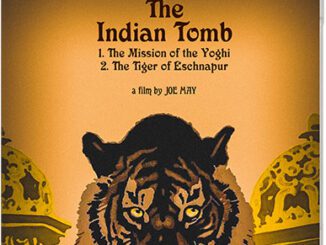
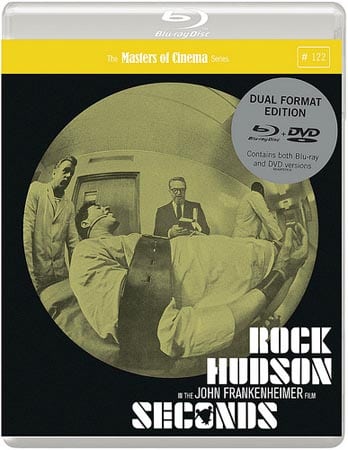
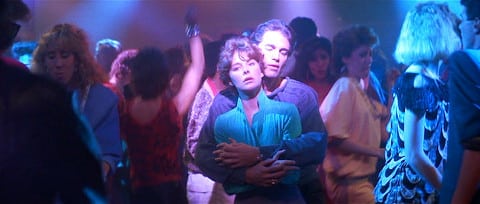
Great review thanks! There are actually three interviews with Rothrock on the disc but it looks like you only covered two of them–the archival interview and the one from her YouTube channel. There’s actually a third video interview (Brand New) that was videotaped on the same day we recorded the scene-specific commentary.
Privileged to have you commenting Mr. Djeng! I do apologise for not mentioning that interview, I must have honestly just missed it! Review has been amended accordingly.